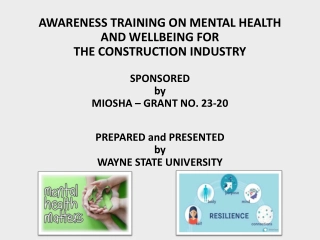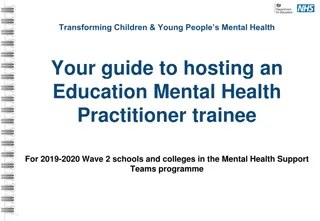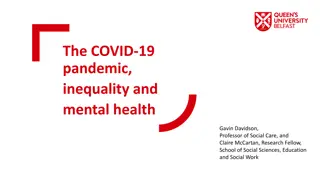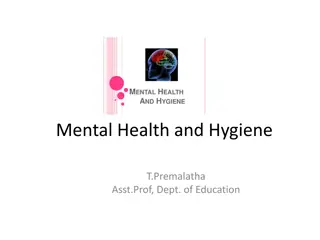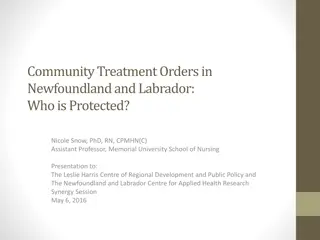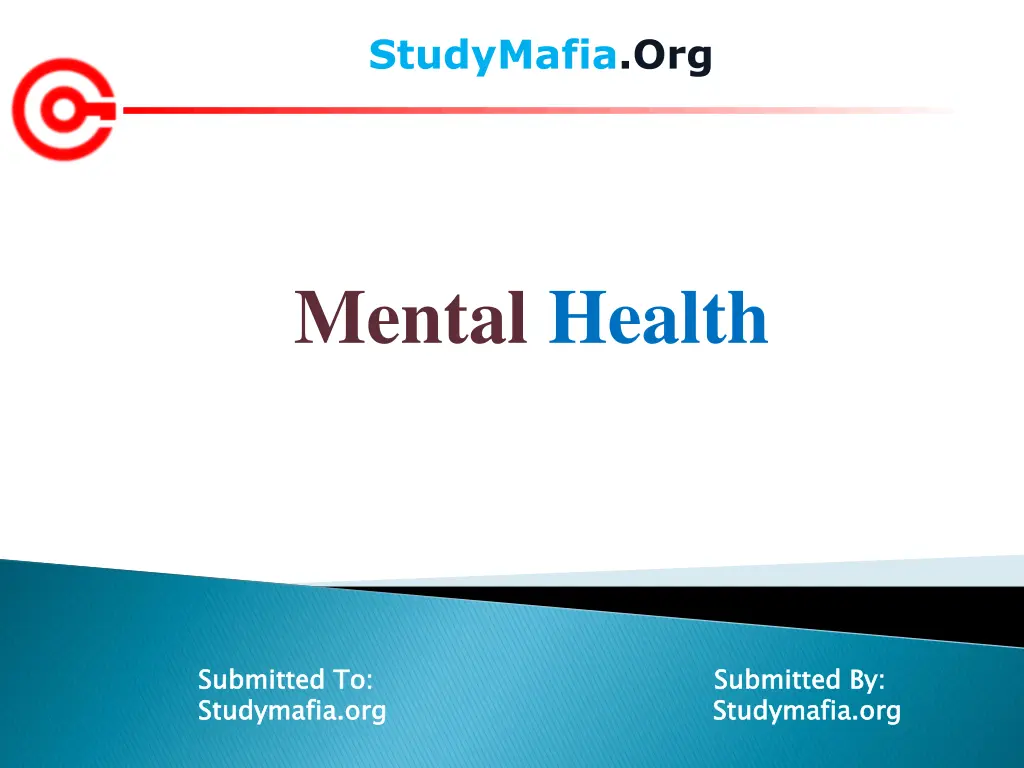
Understanding Mental Health: Importance, Signs, and Myths
Explore the definition and importance of mental health, early warning signs of potential issues, and dispelling myths surrounding mental health. Learn about the impact of mental health on overall well-being and how to recognize signs for early intervention.
Download Presentation

Please find below an Image/Link to download the presentation.
The content on the website is provided AS IS for your information and personal use only. It may not be sold, licensed, or shared on other websites without obtaining consent from the author. If you encounter any issues during the download, it is possible that the publisher has removed the file from their server.
You are allowed to download the files provided on this website for personal or commercial use, subject to the condition that they are used lawfully. All files are the property of their respective owners.
The content on the website is provided AS IS for your information and personal use only. It may not be sold, licensed, or shared on other websites without obtaining consent from the author.
E N D
Presentation Transcript
StudyMafia.Org Mental Health Submitted Studymafia.org Studymafia.org Submitted To: To: Submitted Submitted By: By: Studymafia.org Studymafia.org
Table Contents Definition Introduction What Is Mental Health? Early Warning Signs Mental Health and Wellness Mental Health Myths and Facts Conclusion 2
Definition The term 'mental health' refers to your state of mind. It includes our emotional, psychological, and social well-being. 3
What Is Mental Health? Mental health includes our emotional, psychological, and social well-being. It affects how we think, feel, and act. It also helps determine how we handle stress, relate to others, and make choices. Mental health is important at every stage of life, from childhood and adolescence through adulthood.
What Is Mental Health? Over the course of your life, if you experience mental health problems, your thinking, mood, and behavior could be affected. Many factors contribute to mental health problems, including: Biological factors, such as genes or brain chemistry Life experiences, such as trauma or abuse Family history of mental health problems 5
Early Warning Signs Not sure if you or someone you know is living with mental health problems? Experiencing one or more of the following feelings or behaviors can be an early warning sign of a problem: Eating or sleeping too much or too little Pulling away from people and usual activities Having low or no energy 6
Early Warning Signs Feeling numb or like nothing matters Having unexplained aches and pains Feeling helpless or hopeless Smoking, drinking, or using drugs more than usual Feeling unusually confused, forgetful, on edge, angry, upset, worried, or scared Yelling or fighting with family and friends 7
Early Warning Signs Experiencing severe mood swings that cause problems in relationships Having persistent thoughts and memories you can't get out of your head Hearing voices or believing things that are not true Thinking of harming yourself or others Inability to perform daily tasks like taking care of your kids or getting to work or school 8
Mental Health and Wellness Positive mental health allows people to: Realize their full potential Cope with the stresses of life Work productively Make meaningful contributions to their communities 9
Mental Health and Wellness Ways to maintain positive mental health include: Getting professional help if you need it Connecting with others Staying positive Getting physically active Helping others Getting enough sleep Developing coping skills 10
Mental Health Myths and Facts Myth: Mental health problems don't affect me. Fact: Mental health problems are actually very common. In 2020, about: One in five American adults experienced a mental health issue One in 6 young people experienced a major depressive episode One in 20 Americans lived with a serious mental illness, such as schizophrenia, bipolar disorder, or major depression 12
Mental Health Myths and Facts Myth: Children don't experience mental health problems. Fact: Even very young children may show early warning signs of mental health concerns. These mental health problems are often clinically diagnosable, and can be a product of the interaction of biological, psychological, and social factors. 13
Mental Health Myths and Facts Myth: People with mental health problems are violent and unpredictable. Fact: The vast majority of people with mental health problems are no more likely to be violent than anyone else. Most people with mental illness are not violent and only 3% 5% of violent acts can be attributed to individuals living with a serious mental illness 14
Mental Health Myths and Facts Myth: People with mental health needs, even those who are managing their mental illness, cannot tolerate the stress of holding down a job. Fact: People with mental health problems are just as productive as other employees. Employers who hire people with mental health problems report good attendance and punctuality as well as motivation, good work, and job tenure on par with or greater than other employees. 15
Mental Health Myths and Facts Myth: Personality weakness or character flaws cause mental health problems. People with mental health problems can snap out of it if they try hard enough. Fact: Mental health problems have nothing to do with being lazy or weak and many people need help to get better. Many factors contribute to mental health problems 16
Mental Health Myths and Facts Myth: There is no hope for people with mental health problems. Once a friend or family member develops mental health problems, he or she will never recover. Fact: Studies show that people with mental health problems get better and many recover completely. Recovery refers to the process in which people are able to live, work, learn, and participate fully in their communities. 17
Mental Health Myths and Facts Myth: Therapy and self-help are a waste of time. Why bother when you can just take a pill? Fact: Treatment for mental health problems varies depending on the individual and could include medication, therapy, or both. Many individuals work with a support system during the healing and recovery process. 18
Mental Health Myths and Facts Myth: I can't do anything for a person with a mental health problem. Fact: Friends and loved ones can make a big difference. In 2020, only 20% of adults received any mental health treatment in the past year, which included 10% who received counseling or therapy from a professional. 19
Mental Health Myths and Facts Myth: Prevention doesn't work. It is impossible to prevent mental illnesses. Fact: Prevention of mental, emotional, and behavioral disorders focuses on addressing known risk factors such as exposure to trauma that can affect the chances that children, youth, and young adults will develop mental health problems. = 20
Conclusion The term 'mental health' refers to your state of mind. Positive mental health is about feeling a general sense of wellbeing, confidence and self- esteem. Having good mental health is not just so you can get through the day, but so you can form healthy relationships with others, and enjoy and create the life you want. 22
Google.com Wikipedia.org Studymafia.org Slidespanda.com

